I read voraciously. While for a time my love of reading was suppressed somewhat, by the demands of keeping up with my legal studies, I’m happy to report that it’s come back with a vengeance! (There is light at the end of the tunnel, law students! Your literary libido is not lost!)
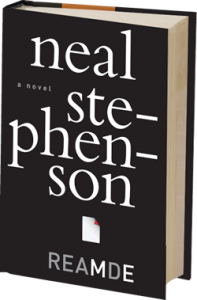
I love your books, Neal, but lugging this gem around is what convinced me I had to quite paper for a while and get an eReader. Owww.
I particularly enjoy Science Fiction, and I’m always on the lookout for new authors. “New” to me, I mean. I decided to delve into the world of eReaders and purchased a Kindle, though on some undefined level I was philosophically opposed to deviating from the printed form. Any vague objections I had were quickly overcome by the fact I no longer had to lug around huge Neal Stephenson novels in my shoulder bag, which is nothing to scoff at when your commute on public transit takes 2 hours one way. Even better than this however, is that oft-maligned experience of ‘instant gratification’ an eReader can provide. When I’ve exhausted my current store of novels, I run a quick search online for top Sci-Fi novels in any given year, and then I flip over to my Kindle and download them. Some have been flops, but many have been a window into a body of work I’d never have known about otherwise.
And so it is that I’ve come across the author Nancy Kress. I’ve been burning through her short stories and novels, completely taken with that old-school ‘aliens are neat, let’s imagine just how neat’ approach to even the current post-apocalyptic fad. I haven’t even reached her most celebrated novel to date, Beggars in Spain (Sleepless) and I’m hooked.
Of course, I wouldn’t be writing this just to mention I’ve found some excellent reading material. In a previous article I discussed Robert J. Sawyer’s portrayal of indigenous peoples in his Neanderthal Parallax trilogy. In some ways, he did an excellent job of questioning certain assumptions, while in another area his writing fit in with mainstream views. Overall, I thought he did a good job of not relying on stereotypes and delving a bit deeper than is often done when we are brought in as characters in novels, film, or video games.
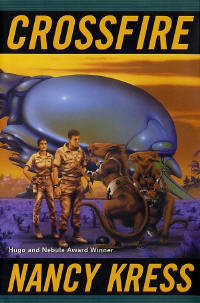
I kind of like that with Kindle, I don’t really see the cover, because let’s face it. Sci-Fi covers are often cheesy.
I’ve found a much more problematic approach in the Nancy Kress novel I’m currently reading, Crossfire, which was published in 2003.
The starting premise of this novel is that a bunch of extremely wealthy groups are travelling together off-Earth to colonise a distant planet. You’ve got a large extended family of scientists, a Chinese contingent, deposed Arab royalty, Quakers, assorted others and…about a thousand Cheyenne.
(As a quick aside, another bonus of the Kindle, is that when I want to pull up quotes for you, all I have to do is search the term “Cheyenne” and boom. One drawback is that the location in the book is not expressed by page number, so if you have a copy of this book sitting on your shelf, it might be harder for you to find the same quote.)
The Cheyenne are a Plains culture. Like so much of the information about indigenous peoples available online, I proffer the linked Wikipedia article with extreme skepticism as to its accuracy. However, it will give you a sense of who they are and where they come from if you are wholly unfamiliar with the Cheyenne.
First, some background from the book. The story takes place in the far future, so the year is undefined. I’ll just quote from the book for this:
“Once they [Native American reservations] were terrible places, the dregs of arable land, full of poverty and alcoholism. Since the natives figured out that as a separate nation they could legally offer services that places part of the Unites States could not, they flourished. First gambling, then genemod and pet-cloning clinics, and –”
“I’m aware that reservations are great scientific centers,” Gail said dryly, “And greenly rich.” – Location 591, Kindle version
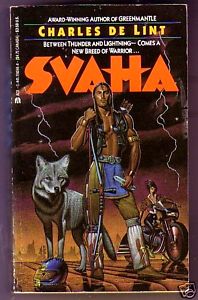
Published in 1989, this has a real cyber-punk feel to it, but swallowing the mystical Indian warrior with his trusty coyote/trickster friend was tough. Let’s call it a guilty pleasure, like anything written by Edgar Rice Burroughs.
Alright! Kress has the reserves crawling out of poverty and into scientific innovation and wealth, an approach somewhat similar to that taken by Charles de Lint in his futuristic yet fetishistic novel, Svaha. (Lot of the noble savage going on in Svaha.) Of course, unlike de Lint’s novel, they do so in morally questionable ways by providing seedy, ‘legal limbo’ services not available elsewhere, which certainly fits into contemporary notions about Indian gambling/cigarettes and so on. I sort of prefer de Lint’s approach of riches being accumulated by the explosive popularity of a mixture of traditional indigenous music with pop tunes for the masses. (Of course I am casting A Tribe Called Red in the updated version.) However, it’s a somewhat positive future prediction I guess.
The “no true technology” fallacy
But wait, that quote isn’t over! Here’s some more necessary background:
“That’s why I don’t understand why this lot wants to dump it all and go back to living as if the last two or three centuries hadn’t ever happened. But with genetic labs in tow, of course.”
One of the themes related to the Cheyenne in this novel is their occasional use and reliance on ‘technology’. Of course, ‘technology’ as it’s generally used, and specifically in this novel, is not any human-made tool, it is “the application of scientific knowledge for practical purposes.”
By definition, this means that no indigenous people can ever invent technology, because doing so would require the use of scientific principles, which were not known among native peoples before Contact because settlers invented science. At least, science as it is defined in relation to technology.
However, this is not a universally applied principle. After all in Science Fiction, aliens can have technology, even if they have nothing comprehensible as equivalent to the scientific method. Maybe we can even retrofit the concept of science to include peoples like the Maya with their complex and precise astrological observations, but probably not. Clearly I do not agree that this is the correct definition of technology, but when the word comes up, I’m fairly certain this is the way people are thinking of it.
Throughout this novel, the ‘desire to leave all technology behind’ which has been attributed to this fictional group, is described in derogatory terms. “Quixotic, ridiculous mission” (Location 3953, Kindle version) and other similar sentiments. These Cheyenne have been set up as foolish Luddities, and are mocked throughout.
I previously addressed the ‘frozen in time‘ approach to Indigenous peoples, and why I believe it is a ridiculous and arbitrary standard. Nonetheless, it is an enduring belief and that approach comes out loud and clear in this novel. In this story, the Cheyenne are trying to rid themselves of all ‘Volcano Man’ (settler) technology, because they are suspicious of it, but the big irony in the book is that they can’t seem to live without it. Once again, the desire to return to traditional indigenous principles somehow gets conflated with the notion that doing so requires native peoples to eschew all forms of technology and revert to exactly how they lived pre-Contact.
I would really appreciate it if authors and individuals stopped pushing pre-Contact conditions as a goal or a desire on our part. Having to constantly explain that no, there isn’t a large movement to get rid of indoor plumbing (assuming we have it in the first place, which given contemporary living conditions in native communities, should not be taken for granted), vaccinations and so forth, is frustrating and draining. Integrating settler technology into traditional indigenous practices does not require us to accept settler philosophies, and it certainly does not erase our indigeneity. Unless you’re talking about settler notions of what it means to be indigenous. And do I need to point out how flawed those Hollywood stereotypes are to begin with? (If so, click on the movie and video-game links in the fourth paragraph.)
Maybe this ‘splinter group’ is deliberately set up as a minority indigenous view against a backdrop of native peoples who have embraced and benefited from technology, but this is a tired meme, and no new ground is being broken by rehashing it.
“Fake” Indians, the blood quantum mess
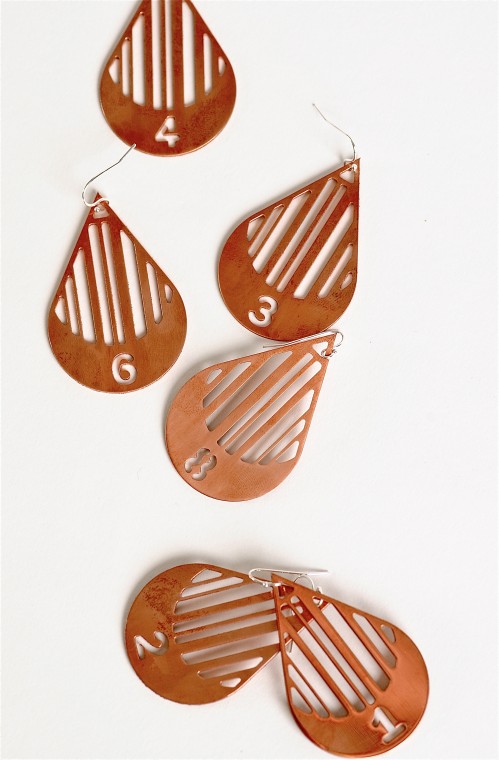
“Blood quantum” earrings, by Chickasaw designer Kristen Dorsey, challenging the public’s notions of how blood quantum affects our cultural identities.
The technology issue is not even the reason I’m writing this article. It’s a pretty standard issue I can ignore for the sake of my sanity and an otherwise good read. So let me get to the real point. Here are some quotes describing the space-faring Cheyenne:
Larry Smith’s dubious tribe of “Cheyenne”. – Location 52, Kindle version
…saying good-bye to nine hundred sixty-seven Cheyenne Native Americans, almost none of whom possessed actual Native American ancestors. -Loc 558
On Earth, he [Larry Smith] had been a cattle breeder. Now he was a Cheyenne chief. – Loc 562
Oh for God’s sake, Gail didn’t say aloud. She’d read the personnel records. Larry Smith was one thirty-second Cheyenne. The “tribe” included Irish, German, Spanish, Swedish, and French blood, and it was in the majority. One brave was three-quarters Chinese, with features no seventeenth-century Native American had so much as ever set eyes on. – Loc 1518
Almost every time the name Cheyenne is written in this novel, it is done in scare quotes. They are the “Cheyenne”. As is made clear in that last quote, these are not full-bloods. They are fakes. Not really Indians, just people playing Indian.
Oh blood quantum. What a strange concept.
In a previous article, I explain the system used in Canada to determine who is a legally recognised (Status) Indian and who is not. Essentially, you are no longer “an Indian” once a native parent and a native grand-parent has married out. That’s extermination of your identity in two generations.
The situation in the US is somewhat more complicated. You can click on this BIA blood quantum chart to get a closer peek at how convoluted the issue can get. Different Tribes in the US have different rules about blood quantum, unlike the universally applicable laws in Canada.
The widespread acceptance and imposition of blood quantum definitions by settlers and their governments means that culture and community acceptance doesn’t matter. You are only a ‘real’ Indian if you haven’t intermarried with non-natives. Nancy Kress buys into this notion completely in her portrayal of the ‘dubious Cheyenne’.
Leaving aside the fact that not all ‘out-breeding’ was done voluntarily, the concept of blood quantum puts enormous pressure on native peoples not to marry non-natives. Imagine someone telling you that you can’t be Canadian because your father and your grandmother came from a different country. Oh, I’m sorry, am I conflating citizenship with ethnicity? Well we never agreed to be defined by blood in the first place, so I’m going to give myself permission to discuss identity in the various forms it is defined.
Blood quantum (BQ) rules have been called a ‘slow genocide’, and I think this is an apt description. Not mass murder, but extinction via definition. Every time a non-native enters the “Indian gene pool”, fewer people in the next generation are counted as Indians. I’m sorry, but what are we? A breed? Or peoples with distinct languages, customs and beliefs?
I can understand the reluctance on the part of settlers and settler governments to consider indigenous culture as a defining aspect of native identity, given how intensely our cultures were repressed and deliberately interfered with. A lot of effort was put in to erase our languages, kinship ties, territorial relationships and so forth. How can any of that possibly matter now, if it’s basically all gone?
Well the answer is, of course, that it isn’t all gone. Indigenous peoples have tenaciously resisted colonisation and the destruction of our cultures. Not without cost, and setbacks, and battles which continue to be fought, but our demise is greatly exaggerated.
The blood quantum approach freezes us in time as well. No genetic mixing allowed after Contact. It was fine before, and did nothing to dilute identity as an indigenous person, but for some reason, non-native blood erases indigeneity?
The idea that Indian blood has some sort of magic quality that imbues one with legitimate indigenous culture, is as stupid a notion as I can think of. This is 19th century pseudo-science, and I don’t want it in my 20th and 21st century-produced Science Fiction, thanks.
I don’t care if Larry Smith’s Cheyenne are all 100% ethnically Chinese (which is somehow even less legitimate than being a mixture of European stock?). This novel takes place centuries in the future, in a time when it is not inconceivable that given current policies, there will be no more “pure-breed” Indians in existence. If Nancy Kress can imagine such a future, yet still make space for there to be a continuation of an indigenous land base (unfortunately still restricted) where indigenous culture is still legitimately practiced, then surely she can reboot the entire notion of blood quantum.
What this novel did for me, was to highlight some of the more problematic stereotypes out there about indigenous people. I cannot avoid confronting these portrayals when they are presented to me, and I’m hoping that the next time you come across a native character in a book you’re reading, you give more than a cursory thought to the image the author creates. If you know of any good Sci-Fi out there that has managed to portray indigenous peoples in less problematic ways, I would love to hear it!

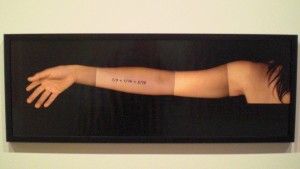
13 Comments
Jadey · October 14, 2012 at 2:40 pm
Someone did a round-up a while back of sci fi/spec fic with an indigenous or post/anti-colonial perspective: http://50books-poc.livejournal.com/159372.html
I also read a steampunk story recently which is set partly in an AlternateUniverse!Australia and deliberately deals with White-Aboriginal relations there (written by a white USian dude, admittedly, though he did his homework on it). Without giving away too many of the plot twists, it doesn’t quite seem like it for the first part of the book, but by the second half there’s a big shift and a lot more Indigenous protagonists with a strong focus on their attempts to change the colonial status quo, interwoven with the magic and steampunk!science of the rest of the story. I don’t know if the author got it right entirely – I’m not native either and not Australian – but it was a good deal better an attempt than I’d read in most speculative fic.
He self-publishes on Lulu and it’s available as an epub: http://www.lulu.com/shop/sam-starbuck/the-dead-isle-ebook/ebook/product-20335326.html or as a PDF for free: http://self.gutenberg.org/details.aspx?bookid=2118708
Jadey · October 14, 2012 at 4:24 pm
Ooh, one other thing though. Dead Isle doesn’t really satisfactorily (to me) address colonialism and racism in the *rest* of the world, even though part of it is set in the US and part in England. There’s one historical reference to an alternative “Contact” scenario and a historical character (Father La Roche), neither of which I’m sure what to make of. *shrug* So there’s that.
moi · October 15, 2012 at 7:41 am
N D N ,IS IN THE HEART ITS MORE THAN ONES MEASURE OF BLOOD ,
MY FULL BLOOD GRANDMOTHER ,AND ELDERS ,RAISED MOI ,THEIR ,LOVE ,
AND TALENT INFLUENCED MY THOUGHTS ,LONG AFTER THEY PASSED,
INSTILLED IN MOI ,PRIDE ,OF BEING N D N ””””” PROUD TO BE ABENAKI “““MOI { DOUBLE CITIZINE ,AMERICAN /CANDIAN
Noni Mausa · October 15, 2012 at 2:11 pm
And of course, “blood quantum” is a fallacy itself, whereas continuous inheritance of a core culture really means something.
Example — in a very simplistic explanation of genetics, you would be told that if Lucy Redmarbles has children with Jack Blackmarbles, the kids will, more or less, have half black and half red marbles (substitute “genes.”) Then if Lucy’s daughter Minx has children with Claus Greenmarbles, those kids would have half green genes and 1/4 each red or black genes.
However, that’s the sort of falsehood that Pratchett calls “lies for children.” People have, instead, about 99.99% general-issue people marbles (aggies, maybe?) with a sprinkling of colored marbles for variety which don’t really effect the underlying marbleness. By and large it is culture and environment that creates the adult differences.
Having said that, I must comment that I have encountered a quality of energy in native people (not all, but many) which I can only describe as a great heart, a heart whose energy expands beyond the bounds of their skin as the heat of a stove radiates beyond the actual burner, detectable across the room or even in the dark.
Take it for what it’s worth, that’s my experience.
Noni
TokyoRose · October 17, 2012 at 10:55 am
If you haven’t already seen it the documentary “Reel Injun” by Neil Diamond addressed much the same situation as it exists in our film culture. It’s a fantastic movie and really gave perspective into mainstream society’s willingness to accept stereotyping towards First Nations & Native American people for the sake of “entertainment”. I watched the film with my high school last year and we had an intense and extremely thought provoking discussion that lasted days after we had viewed the film.
I haven’t read many books that exploit Native peoples in the same way so thank you for taking the time to share your thoughts on this.
âpihtawikosisân · October 17, 2012 at 11:45 am
Reel Injun is the film I link to in the fourth paragraph:)
It is a must-view in my opinion. For every single person living in the US and Canada.
Khelsilem · October 17, 2012 at 7:10 pm
Critics say Indian Status laws are the slow genocide and extermination through legislation. Except critics also fail to recognize that Indigenous communities want their communities to be Indigenous — meaning with Indigenous ancestry! Important to say, that I can’t say this is wide-spread, because each nation or people has different values, experiences, and diversity (even within the community).
My elders and leaders always advocated Indigenous people having children with other Indigenous people. That is an important part of future generations being Indigenous. I’ve had elders and leaders make various arguments to support the importance of this belief, but here is mine…
In our communities I think it is important to think about who we want to be. We do we envision our people to be in three, four, seven, or ten generations. In this conversation there may be different views and perspectives. The important aspects of identity that I want to see flourish and alive in future generations are language, connection to territory, involvement in community, contributing to advancing the nation/community. I want the identity of my people to be based around our traditional values and the original teachings. This involves genealogical or kinship ties, connection to ancestral practices that are unique to our culture, and participation in the culture and ceremony.
If we we’re to have a conversation about raising healthy, strong, decolonized Sḵwx̱wú7mesh children, I was think of what is the best way to do that. In my opinion having two healthy, strong, decolonized Sḵwx̱wú7mesh parents would be best. If that is not possible, then one healthy, strong, decolonized Sḵwx̱wú7mesh parent, and one from a neighbouring community of similar cultural backgrounds, and if that is not possible then another person from an Indigenous culture with similar beliefs and teachings, and if thats not possible then an Indigenous person.
Is it possible to raise a healthy, strong, decolonized Sḵwx̱wú7mesh child with one parent Sḵwx̱wú7mesh and one that is European Settler? Of course! But we have to admit its rare and requires a lot of exceptions to that is standard to European Settler society.
In this conversation it comes to a divergence of views: Do we have a choice in who we have children with?
Some say, yes we do but sometimes you can’t choose who you fall in love with. Some say yes we have a choice and you make choices about who you date, start a relationship, maintain a relationship, etc.
None of this has to do with blood quantum for me. This has to do with who we are as a people, and who we want to be.
I have problems with Indian Status and rules governing them, but the “native parent and a native grand-parent has married out” is not one of them.
Just another viewpoint to consider. =)
âpihtawikosisân · October 18, 2012 at 5:08 pm
You may not have a problem with this particular aspect of the Indian Act, but do you really want the Federal government to be the one to determine who is a member of your Nation? Isn’t that a decision that should be made by Nations themselves? The Indian Act does not consider different viewpoints, it is a ‘one size fits all’ approach.
Michelle · October 19, 2012 at 12:37 pm
This comment may seem completely random and unrelated to your initial post….but I was searching for some content for my Nursing course in which I teach in Vancouver BC…which I found – and thank-you, and I happened to come across your “about” section from your blog. I am disconnected from my mom’s family, however I know they where/are Metis from just outside of Lac Ste Anne and Cree speaking. If you have time could you e-mail me back?
I would be ever so grateful 🙂
Robert Columbia · June 9, 2016 at 8:44 pm
This was a very eye-opening article. This is not only a Native issue. Many times, people such as myself whose ancestors left Ireland in the 1800’s are accused of being “Plastic Paddies” (fake Irish), as if living in Ireland, being born there, or having zero non-Irish ancestors was a requirement for Irish identity. My Irish ancestors were dispossessed of their land in Ireland due to politics and famine and chose US citizenship and intermarriage with the Pennsylvania Dutch (ethnic Germans of the Delaware Valley) as a means of survival. Does that make me Irish AND German? Do I have to pick one? Am I somehow neither?
If land dispossession was truly enough to strip a person of their ethnic identity, then most Native cultures would have dissipated into logical nonexistence by this point. Obviously this has not happened, so loss of land isn’t enough. Similarly, loss of language (e.g. Irish in my family’s case) isn’t enough, or otherwise many living native tribes would be considered dead by reason of language.
When asked, I usually consider myself more Irish than German as a matter of personal identity (it’s complex!), but the idea of somehow measuring (e.g. with a DNA test) the exact quantum of Gaelic blood versus the exact quantum of Teutonic blood in my body and issuing a formal adjudication of ethnicity seems ridiculous. Similarly, the idea of trying to “de-Irish” me for failure to conform to the latest cultural trends coming out of Dublin today and my lack of sympathy for Irish nationalist rhetoric is also absurd.
-A whole sort of Celto-Germanic Mish-Mash
Alex Campbell Lowenstein · May 13, 2019 at 4:47 pm
I feel as though both denying someone’s ancestry and claiming a lost nationality are equally absurd. I can say I have Cree, Scottish, Jewish and indeed, probably some Irish ancestry by way of Scots living there for a while, but to claim that having a mixed ancestor makes me native in the literal sense, that having a Scottish middle name makes me Scottish in the same way that Alex Salmond is, or that having Jewish ancestry on my father’s side means I go to the Synagogue every Friday is equally absurd.
The vitriol laded at both “plastic paddies” and people claming First Nations ancestry seems to have far more to do with politics than it does with facts.
Given that the US claimers of Irish ancestry are settlers to the American continent, it is taken for granted that their descendents are not native and are therefore from someplace else; hence, it seems absurd to locals that, for an analogous example, the descendant of someone writing the Declaration of Independence would count as a Brit.
In the case of First Nations ancestry, there seem to be a variety of political faux pas which get in the way of being able to mention an interesting part of my ancestry without offending someone, from the oppression of Native folk by settlers, to absurd legal fictions which take away clearly Native people for marrying the wrong person or grant Native status to people with no ancestry to it, to moronic, pretentious white hippies who appropriate Native identities by claiming, entirely, falsely to be related to Cherokees in order to relieve their white guilt.
There’s also a degree of absurdity in that First Nations groups, having had most of their land taken from them, are denied the opportunity to define themselves via culture rather than by race, along with the fact that the demands are going in the wrong direction simply because the settlers have better weapons.
Scifi and Speculative · June 29, 2018 at 10:46 am
I got to this via your Twitter, so sorry for being late to the discussion. I just wanted to add that the incredibly low amount authors are paid probably exacerbates this problem because they can’t afford to hire the sensitivity writers they really want… so they try to research it themselves. I’m talking from a self-pub experience, I have no idea if a publishing company would go ahead and pay that bill for you, but I somehow doubt it. It’s not a great excuse, but it is a symptom of the industry as a whole right now.
By the way, this is Sir Walter Scott’s house, just by way of comparison in how authors were regarded and compensated before today… https://en.wikipedia.org/wiki/Abbotsford_House#/media/File:Abbotsford_Aug2009_01.jpg
Nathan · January 18, 2022 at 3:35 pm
I don’t consider it pseudo science for the 19th century administration to have considered people a group based on their heritage. As far as anyone in Europe was concerned at the time, that was exactly how it worked.
However, I agree that this is a poor way to measure a group in the current era, especially one that’s geographically diverse and has a rather small population. Genetics, especially poorly understood genetics as we saw during this time period, typically leads to groups being discriminated against when applied in policy. A culture that has raised you is your culture. Case in point, I am Canadian not because my great great grandparents were Canadian, but because I was born in Canada and raised to these values.
I could perhaps see an attempt to argue for blood quantum on the basis of how many members of the family were actually impacted by historical inequality, but I would agree that since the culture as a whole suffered from it, then that impact is passed down to anyone who practised the culture.
One thing that I did like about this article is that it acknowledges that modern conveniences are a good thing! There are certainly moments when speaking to elders that you get the impression “everything about your culture is bad. You suck.” (obviously paraphrased) This has always seemed illogical to me if applied to technology, something that’s rather neutrally with respect to culture. I’m glad that this myth was refuted here.